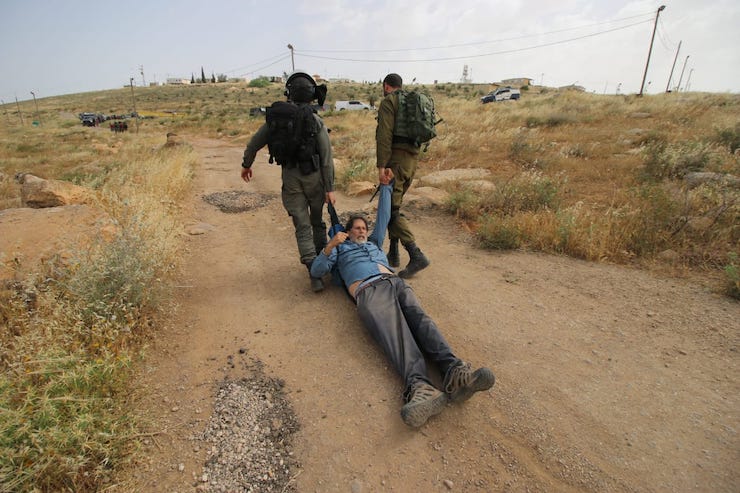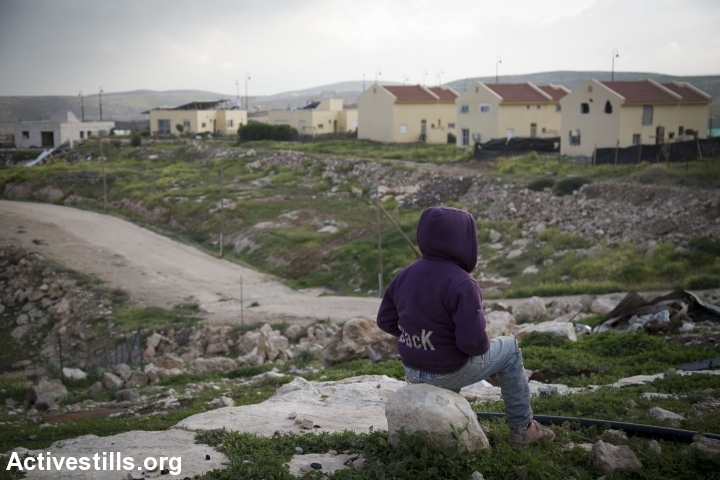By Rachel Shenhav-Goldberg

In 2012, two Israeli residents of Mitzpe Yair, an unauthorized settlement in the Hebron Hills, spontaneously attacked an elderly, unarmed Palestinian man, beating him so badly that he was hospitalized. Since Israel is, according to the Oslo Accords, obligated to regulate all aspects of civilian life in the occupied territories, soldiers from a nearby army base were deployed to search for the perpetrators.
The search was desultory and unsuccessful; the soldiers were ordered back to base within a couple of hours. During a debriefing the next morning, one of the soldiers asked his commanding officer what they should do if the reverse happened — i.e., what if they saw two Palestinian residents of the same area spontaneously attacking an unarmed Jewish settler? The officer’s curt response: “Shoot to kill.”
One of the soldiers at that briefing recounted the incident, which received almost no coverage in the Israeli media, to Breaking the Silence, an organization of veteran Israeli combat soldiers that works to raise awareness about the occupation. His account is one of 41 collected from former combat soldiers who served in the area; they are compiled in a new publication called The South Hebron Hills: Soldiers’ Testimonies, 2010-2016.
The purpose of the book is set out in the introduction, which presents the organization’s mandate: by collecting the data Breaking the Silence seeks to present a clear picture of the “systemic and institutionalized” discrimination between Israeli settlers and Palestinian residents that defines Israel’s military occupation of the West Bank. They believe that by recording and presenting this information to the public, they will raise the awareness that is a first step toward ending the occupation.
The report shows the effect of discriminatory law enforcement, with settlers treated as privileged citizens while Palestinians have almost no rights at all. Not only does this policy perpetuate the occupation and oppress the Palestinians, it also allows settler riots like the one that occurred in mid-October, with settlers from Yitzhar attacking volunteers from Rabbis for Human Rights while they harvested olives with Palestinian farmers.
Reading the testimonies is a harrowing experience; in the aggregate, alongside the data, they make it impossible find any shred of morality in the occupation.
A recent poll found, again, that most Israelis identify the Israel Defense Forces as the most moral army in the world. In popular culture, the army is presented as a defensive force that carries out the critical task of protecting Israeli civilians from violent enemies. The South Hebron Hills presents a very different picture of the army. In their testimonies, the former soldiers describe a private security company that puts settler interests first, while abusing Palestinians — who, for the most part, are no threat to anyone.
According to the testimonies, the soldiers were told that their job was “deterrence,” rather than “defense.” Their orders were to make Palestinians feel that Israeli soldiers were “the boss”; this was often accomplished through gratuitous violence, which one former soldier describes as “just to drive people crazy.”
There is no democracy in the Hebron Hills. The settlers are the lords of the land, and the army does their bidding, to the point that one former soldier says he frequently could not tell the difference between orders from his own commanding officers and those from the settler “security coordinators.”
Another former soldier recounts that the army blocked the roads leading in and out of Palestinian villages in order to protect a few settlers.
The “shoot to kill” order applies only in the case of Palestinians attacking settlers. Soldiers are not permitted to use force against settlers who attack Palestinians, or even against those who attack soldiers. That is why border police were deployed, rather than regular soldiers, to deal with the October 16 incident involving Yitzhar settlers who attacked olive harvesters
The soldiers who testify to Breaking the Silence recount having witnessed settlers assaulting Palestinian children on their way to school, beating farmers in olive groves, and attacking random individuals harassed for no apparent reason. None of this is new, but in the aggregate the testimonies are powerful, as is the culture of impunity. The army does almost nothing to apprehend violent settlers, while the Israeli media covers only the most egregious incidents. The consequence of the poor media coverage is a distorted version of reality: most Israelis so rarely see reporting on settler violence that they believe it is rare, and therefore not representative.

Those soldiers volunteered for combat service after high school with high hopes and idealism, and with their morality intact. By the end of their service, they carry the heavy emotional burden of having participated in immoral acts. Those who try to resist illegal orders only feel helpless. As one soldier testifies:
… You don’t know exactly where to direct your anger: I remember that even then I knew that something there wasn’t right. On the one hand not right, on the other hand it’s your company commander, so like who are you supposed to report it to?
These young soldiers are also victims of an oppressive system. Now they are trying to make amends by telling the public what they did, and why it was wrong.
Rachel Shenhav-Goldberg is an Israeli living in North America. She has a PhD in social work from Tel Aviv University and a post-doctorate from the University of Toronto. Her research focuses on anti-racism in Israel and antisemitism in North America. She is also a group facilitator, practices social work, and volunteers with the New Israel Fund in Canada.
